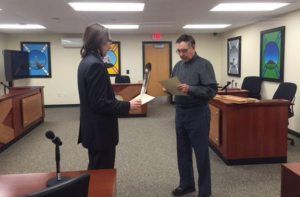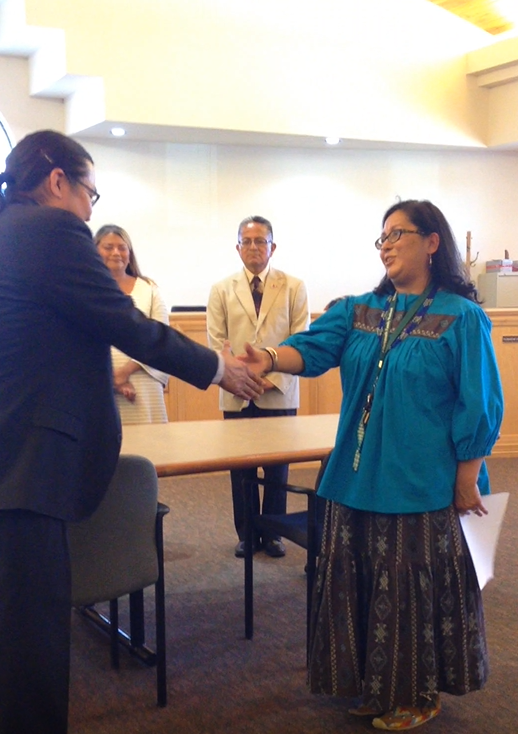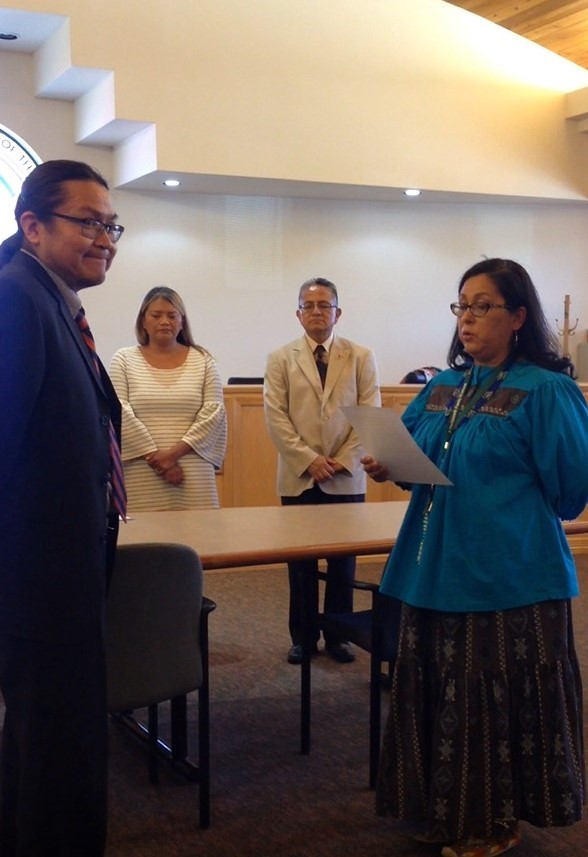This is the second part of the Alumni Tribal Court – Experience and Advice series.
There are a variety of areas of law that are offered at ASU’s Sandra Day O’Connor College of Law, and many students have wondered: ‘What can I do with my law degree?’ We asked some of our alumni to share their experiences, expertise and advice on becoming a tribal court judge and the responsibilities in that position.
- Shawn Attakai (’00) tribal appellate court judge for the Yavapai-Apache Nation Court of Appeals in Camp Verde, Arizona
- Sean Cahill (’11) tribal appellate court judge for Little Traverse Bay Bands of Odawa Indians in Petoskey, Michigan
- Joseph Flies-Away (’04) former chief judge of the Hualapai Court of Appeals in Peach Springs, Arizona
- Anita Jackson (’93) former pro tem judge for the Sitka Tribal Court in Sitka, Alaska

(Judge Sean Cahill being sworn in)
Q: How long have you served as a tribal court judge?
Shawn Attakai: I was appointed in June 2018. I have been a judge for approximately one year.
Sean Cahill: Has sat on the Appellate Court of Little Traverse Bay Bands of Odawa since 2015.
Joseph Flies-Away: It wasn’t a choice, really. It’s just what happened. I was working for the Hualapai Tribal Nation as an economic development planner/grants writer and then became a tribal council member. Then the chairman said, “Somebody should go to law school,” and from that point on it was put in my head that I should go. I went to law school to be helpful to the tribe with economic development. The lawyers supposedly always had the answers. So I went to law school. After completing the first year I was appointed chief judge, which was not a plan of mine, but it happened. I was the chief judge for a two-year appointment after one year of law school. I learned how to “do” law while acting as a judge, not from law school. Then after the two years I went to the Kennedy School at Harvard University. After that I came back to Arizona and started law school all over again and finally finished in 2004. I have served as a pro tem judge for other courts as well. Much of my work as judge (at Hualapai) was in the wellness court. Working as a judge was a serendipitous thing; it just happened.
The late Delbert and late Earl [Havatone], both former Tribal Chairmen of the Hualapai Indian Tribe, followed each other in their leadership. The two of them were sitting around and one of them said to me, “You should go to law school.” I had thought about it as a kid, being a lawyer or a doctor. I think like a lot of kids do, I guess. When they said it, it made sense. We always had to have a lawyer present, because every time there was a question they had to look to the lawyer, and I think Delbert and Earl didn’t like that. They were not Hualapai. They knew I could do it.
[I was approached about becoming chief judge when] my cousin called me and said, “They have the chief judge job open. Do you want to do it?” I said, “I’ve only been in law school one year,” but she said, “I think they want to appoint you.” I could have said no and not apply, but that wasn’t the kind of thing you do.
Anita Jackson: I served as a Tribal Judge for 16 years.
In December 1979 I was hired to work as the Juvenile Advocate for my tribe’s Legal Aid Program. This was the first exposure I had to the law and I realized then that I wanted to have a career in law. In the spring of 1980 I applied for the Tribal Juvenile Court Judge and was selected (our Tribal Council appoints our judges). I took my oath of office in June 1980 at the age of 27 and served for two (2) four-year terms.
I have been elected to serve on my Tribal Council for this next term. I will be sworn-in on May 6. A new chapter and another opportunity to serve my people in a different role.
 (Judge Anita Jackson, 1980’s)
(Judge Anita Jackson, 1980’s)
Q: Why did you choose to pursue this career? What was your pathway to serve as a tribal court judge? Did your time at the ILP impact this decision in any way?
Shawn Attakai: Currently, I am serving as a judge on a part-time basis. My current job is a staff attorney advising the Navajo Nation Judicial Branch. My judge job is serving the Yavapai-Apache Court of Appeals. I was told that this job as a court of appeals judge has a light caseload. So far we have only decided motions. However, I joined the ranks of judgeship hoping to help develop the tribal jurisprudence. I am taking baby steps toward this career. I have been advised, culturally-speaking, that as a young person, I should not be at the forefront of Navajo leadership. Although I went to school at an Ivy League and at ASU, I respect my elders and culture. I can speak my language, but for now, baby steps. The ILP definitely had a part in my decision to become a judge. Judging for the [26th Annual National NALSA] moot court [hosted at ASU Law in 2018] helped me change my perspective from the attorney’s table to a view from the bench. I think the moot court is valuable in terms of building your skills and seeing how other judges decide their cases. I have served as a commissioner at the Navajo Nation and this moot court experience is paying off there too.
Sean Cahill: The ILP, and specifically the Indian Law Clinic, introduced me to tribal courts and showed me their importance in tribal government. I sit on the Appellate Court of the Little Traverse Bay Bands of Odawa, where I am enrolled. When a justice position opened up in 2015, I had been working in-house for the Grand Traverse Band of Ottawa and Chippewa Indians. The Justice position presented an opportunity to serve my tribe, and it has truly been an honor to sit on my tribe’s court.
Joseph Flies-Away: I went to law school where I tried to understand what law is. Law to me became something very spiritual, something that connects us or disconnects us. I started putting the law into my paradigm and then my two dimensional model became spherical, and as I kept working at it, all these different parts—the individual, the group, conflict or cooperation—it all just fit.
Anita Jackson: Initially my cases were limited to cases where children were alleged to have been neglected, abused or were juvenile offenders. I grew up on my reservation so I was aware of the state of the economic and social standings of my tribe, of family ties and interrelations.
I began presiding over cases involving adults toward the end of my first term. Because our reservation was originally exempt from PL 280, the State has very little jurisdiction on the reservation so our court exercises jurisdiction over almost all legal matters. This includes matters involving criminal actions committed by Indians and non-Indians, domestic relations, civil regulatory and adjudicatory cases, probate, traffic, and the exercise off-reservation treaty-reserved rights such as off-reservation hunting and fishing.
The long-time Chief Judge resigned early in my second term and although I applied, I was not selected to fill that position. The new Chief Judge came from North Dakota and I was assigned to “show him the ropes”, which I did. For several reasons he left a couple of years later and I was temporarily appointed as the Chief Judge until the Tribe hired a non-Indian man to replace him; again I was required to bring him up to speed.
Q: What have you learned in your current position that has been different from positions that you’ve previously held?
Shawn Attakai: The perspective of being a lawyer in the courtroom is very different than being a judge. Lawyerly work requires advocacy on behalf of your client. You mainly advance only one side of the argument, the side that is beneficial to your client. Judicial work requires looking at the whole situation, and being impartial and looking at the legal issues from both sides. Impartiality is probably one of the biggest cornerstones of the adversarial court system.
Sean Cahill: I work both in-house at Grand Traverse Band and on the court at Little Traverse Bay Bands, so I experience the distinct roles of advisor/advocate and arbiter. Obviously those roles are different, but fulfilling them regularly has shown me just how stark that difference is.
Anita Jackson: Although there was, and still is, no education requirement for our tribal court judges I could see that I would never advance without formal education credentials so I resigned in August 1988 and proceeded to complete my bachelor’s degree and earn a law degree. I earned a Bachelor of Science from Oregon State University in June 1990 and enrolled at Arizona State University’s Sandra Day O’Connor College of Law in August 1990. I earned my JD in 1993. I did serve a three-year term as a judge of our Court of Appeals from 1988-1990.
My career plan was to eventually return to my tribe and serve as the Chief Judge. I was appointed Chief Judge in 2005 after working in a variety of other law-related positions with my tribe and served in that position until October 2010.
(Judge Attakai being sworn in)
Q: What advice do you have for students interested in a position as a tribal court judge?
Shawn Attakai: The main advice is to learn your language and culture. American law schools such as ASU Law produce a lot of lawyers fluent and excelling in Anglo-American law, but we have to remember that we are tribal people. As the Marshall Trilogy mentions, we Native Nations are “separate and distinct.” We are dependent on that distinction. If we tribes were not “separate and distinct,” then there would be no “tribe,” no tribal judiciary for us to be tribal judges. So that our great-great-grandchildren can be “tribal” judges, I think it is important today to know your language and culture and to implement that knowledge into your work as a judge.
Sean Cahill: I lucked into the position in the sense that I am a tribal member who lives fairly close to my rural reservation. That said, I was able to secure the nomination because knowing about the vacancy gave me an opportunity to apply. First, then, pay attention to the tribes in whose court you would like to serve. Some actively recruit candidates, some post widely, and some do not. Second, the key for me to parlay the nomination into an appointment was preparation. Know the tribe’s circumstances and its laws—its constitution, statutes, and customary and common law. Finally, it can’t hurt to have experience in a court. I clerked as an extern for Maricopa County judges during my 3L year, and that experience, along with the bench memos and opinions I wrote, proved invaluable. Finally, it goes without saying: Get the best grades and job experience that you can. Many tribes are balancing the need to have their judges and justices come from their community with the desire to appoint the most qualified and distinguished candidates.
Joseph Flies-Away: Somebody said to me, “It must be exciting being a judge.” I remember looking at that person and saying, “Exciting? It’s awful.” They looked at me, surprised. When you’re a judge, you’re adjudicating all types of cases and you know all the bad things, all the allegations of bad things, which are horrible and sad. And of course, not all of the allegations are true but you have to hear about it all, deal with all the people, and deal with the ones that are hurting. It was never a “fun” experience to be a judge.
The only part that’s “fun” maybe is the legal aspect; figuring out what the law means and how it is applied in a situation. I like to see how the tribal code applies to a case, how legal definitions are applied, what words mean. That, to me, is the interesting part, not whether someone beat up a person or burned down a house or abused a child. There’s no excitement, no happiness, no goodness in that part of it. It’s not a fun job. I don’t think I could ever be a full-time judge again.
Anita Jackson: Tribal courts exercise various types of jurisdiction depending on their land base, whether they are subject to certain federal laws, treaty-reserved rights, water rights, and so forth. It is important, therefore, to know how to balance traditional tribal laws with recent tribal statutory laws, and relevant state and federal laws.
True separation of powers rarely exists in tribal governments and, therefore, tribal councils often try to interfere with tribal courts. It is important to educate tribal council members on the benefits of separation of powers within the tribe to ensure checks and balances on governmental powers exist.
Q: Please share your thoughts about the role of tribal courts in tribal communities.
Shawn Attakai: Tribal courts play a vital role in tribal nations and their communities. Making decisions using your own tribal law is an exercise of sovereignty. The act of making decisions as a court goes to the tribe governing itself and its territory. I cannot stress enough the importance of this function.
Sean Cahill: From what I’ve seen, tribal courts are deeply embedded in their communities. They play a role in governance and promote healing, in addition to the traditional functions of resolving disputes and meting out justice.
Joseph Flies-Away: It’s important for all sovereigns, states, as well as tribes, for people to work together. They have to learn to do that. They need to work together because there are a lot of overlapping issues and situations that require them to do so. It’s very important to collaborate, but there are limitations to it. If people aren’t able to respect each other, then they shouldn’t work together too closely, because I’ve been in situations where you could tell, there was no respect for the other—mostly Anglos toward the Indians, though it happens vice versa as well. We may be different, look different, and do things differently, but we can’t participate in cooperative measures if there’s no respect. There are many people out there who still don’t trust the other people. They say right out, “Well, we can’t trust Arizona; they’re going to act like this, or we can’t trust the judge in Mojave County or whatever.” Over time, I think, as more respect is built, a better collaborative scenario would be available. Both systems would benefit from understanding that, “Wow! They’re doing something differently, we should try that,” or “Their technology is this way, we should try that.” There are things to learn from each other in a very good way.
Anita Jackson: Tribal courts have a very important place in tribal government. They generally began as criminal courts but have grown and expanded over the past fifty or so years to provide resolution of person-person conflicts as well as non-criminal person-tribe conflicts. As tribal courts expand they are challenged by not only tribal leaders but also non-tribal governments and people. The integrity of tribal judges is often questioned so it is very important to have the courage to stand firm on principles and law.
There is nothing more satisfying than working for your own tribe and at the same time, there is nothing harder or more taxing. Do not expect positive changes that you make as a tribal judge to be immediate nor initially appreciated. You must have courage, a strong backbone, thick skin and keep a long-view of justice in your own community.
Q: Anything else you’d like to add?
Shawn Attakai: I hope that in the future, I mean way in the future, that we maintain our cultural identities as tribal nations. We put in a crazy amount of effort in taking the LSAT, passing 1L, passing the bar, and succeeding in this society as lawyers. We can put that same energy into learning and re-vitalizing our languages and traditions. I believe our effectiveness as tribal legal practitioners would multi-fold, especially for the younger generations, if we could all do that.
Note: Quotes included from the Center for Court Innovation’s interview with Flies-Away. Read the interview here.
Read the first part of the Alumni Tribal Court – Experience and Advice series here.
____
Miranda Cyr
Communications Aide, Indian Legal Program, ASU Law


